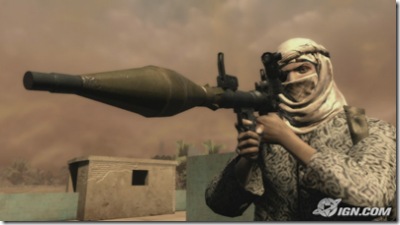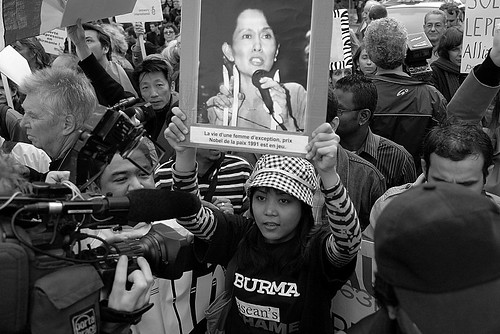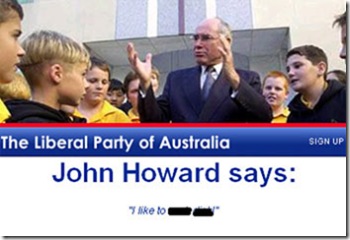Home » politics (Page 14)
Category Archives: politics
R18+ Category for Video Games In Australia (The Saga Continues)
Australia has once again got an R18+ category for videogames on the discussion table. However, as Asher Moses reports in The Age:
In the gaming community at least, South Australian Attorney-General Michael Atkinson has become the Darth Vader of politics with his opposition to R18+ ratings for games. But Mr Atkinson insists his forceful opposition is to protect children from “harmful material”. Australia is the only developed country without an R18+ classification for games, meaning any titles that do not meet the MA15+ standard – such as those with excessive violence or sexual content – are simply banned from sale by the Classification Board.
Any changes to the censorship regime must be agreed on by the Commonwealth and all state and territory attorneys-general. For the first time since November 2005, the issue will be discussed later this month at the Standing Committee of Attorneys-General, but Atkinson has confirmed he will maintain his long-running opposition to the idea. […] In a speech in South Australia’s State Parliament yesterday, during which Atkinson was forced to return to his seat after being cut off by interjections, he acknowledged blocking the R18+ rating would deny adults choice. But he said this was necessary as the alternative would allow children easy access to “potentially harmful material”. “Games may pose a far greater problem than other media – particularly films – because their interactive nature could exacerbate their impact,” he said. “The risk of interactivity on players of computer games with highly violent content is increased aggressive behaviour.”
I’ve long been a proponent for the R18+ rating for video games in Australia and now that it’s in sight once again, I’m really troubled that one man – Michael Atkinson – could stand in the way. Let me just reiterate why the R18+ category is important:
- The majority of video game players in Australia are adults and thus deserve the right to decide for themselves what games they’ll play.
- Banning video games increases their notoriety, making them more appealing to kids and teenagers, meaning that they are far more likely to download them illegally or purchase them in or from another country.
- Part of the argument against the R18+ category seems to be a presumption that Australia’s current ratings system for film, tv, etc., isn’t effective. If the ratings system is broken, focus on fixing that, not blanket bans on whole sections of a medium!
- There is no substantial evidence that violent video games cause violent behaviour. (There are small-scale studies which see some increase in violent thoughts (not actions: thoughts), but there are an equal number of studies that show no correlation. A lot more research and study here would help! Personally, I’m reminded that at the beginning of the twentieth century books were being banned for corrupting the moral fibre of society; in the 1950s and 60s rock music had similar charges levelled against it!
- Interactive doesn’t equal addictive, nor does it dull the critical senses of players. If someone can’t distinguish between games and everyday life, the there’s a lot more to worry about than the games.
While The Age and other reports are supposedly trying to be neutral in their reporting, I suspect from the last few lines of Moses’ report on the issue, his sympathies are with those arguing for the R18+ category, too:
Research conducted by Bond University in Queensland for the IEAA found that the average age of Australian gamers is 28 and over 50 per cent of gamers are over 18.
Another survey of 1601 Australian households, conducted by the university in 2005, found 88 per cent of Australians supported an R18+ classification for games.
“From what I’m hearing the majority don’t seem to be opposing the R18+ [rating for games], so i’d be interested in what constituency he (Atkinson) is fighting this cause for,” [Ron] Curry [CEO of the games industry body, the Interactive Entertainment Association of Australia (IEAA)] said.
Logan Booker, editor of the gaming blog Kotaku Australia, said that ultimately parents, and not the government, should be the ones take responsibility for restricting what games their kids play.
“The UK, Europe and the US seem to handle an R18+ rating just fine, isn’t Australia mature enough to cope as well?”
Sorry

Saying sorry to the Stolen Generations isn’t the solution, but it is the beginning of a solution. Like Jean, I choose to be optimistic that this apology is an important and substantial step in the right direction for all Australians.
Update: Kevin Rudd has said sorry on behalf of all Australians, which is long overdue and most welcome. You can read the apology or watch it here.
[Photo by Spud Murphy]
Tale of Mighty Rudd Ascension
As the description tells us, “Short propaganda philosophy tells tale of mighty Rudd ascension” …
Without a doubt, one of the best political satires, and mashups, of the 2007 Federal Election campaign thus far. And, yes, for those who watch The 7.30 Report, I am getting YouTube pointers from Michael Brissenden these days. After all, he’s a keen YouTube watcher himself now; as last night’s report said:
The 2007 election will be remembered as the YouTube campaign – the first time the internet became a real force. Both sides are exploiting cyber space relentlessly but as we have seen already, the net is not always such a comfortable place for politicians.
Bring on the political discomfort! 🙂
Update: NineMSN staff writers seem to like this clip, too.
Australia Bans ‘Soldier of Fortune: Pay Back’ Videogame

As Asher Moses reports in The Age, Australia’s censors have banned yet another videogame:
Australia’s draconian classification regime for video games has taken yet another scalp, with local retailers banned from selling the upcoming shooter title Soldier of Fortune: Pay Back. The highly anticipated game, which was to be released on PC, Xbox 360 and Playstation 3, was refused classification by the Classification Board for being too violent. Aside from Singapore, which is reviewing its classification system, Australia is understood to be the only country in the western world that does not have an R18+ rating for games. As a result, games that do not meet the MA15+ standard – such as those with excessive violence or sexual content – are simply banned from sale. This is despite recent figures from the Interactive Entertainment Association of Australia (IEAA) showing the average Australian gamer is 28, and over 50 per cent of gamers are over the age of 18.
While Solider of Fortune: Pay Back certain sounds very violent, the decision by the Office of Film and Literature Classification (OFLC) should, of course, have placed this game in an R18+ category, if only Australia had such a rating for games. Instead, games like this are refused classification altogether, implicitly suggesting that videogames are meant for kids (by having no adult game category) despite, as Moses notes above, the average age for gamers being well over 18 in Australia! Really, it’s time for the OFLC (and the Governors General at State and Federal levels, who’d need to push such a plan) to take note of the actual demographics of game players in Australia, and update the ratings system accordingly.
Of course, as comments on The Age‘s Screen Play Blog suggest, officially banning this game will likely result in it being downloaded illegally or simply purchased overseas – and legally – in pretty much any other English-speaking country.
e-Lection.au
No Australian can have missed the news that we’ll be voting in a Federal Election on November 24. The advertising onslaught has begun and, unlike past campaigns, this one’s taking online campaigning seriously, with the current Liberal government apparently spending upward of $5 million on their web-based advertising. In the lead up to the official election campaign we’ve seen Labor make considerable inroads with both MySpace and Facebook. Indeed, Team Rudd have been so clever with Facebook that Kevin not only has his maximum-allowed 5000 friends, but there is also an “I want to be Kevin Rudd’s Facebook Friend, Too!” Facebook group which has over 10,000 members and uses Facebook’s structural limitation as a popularity mechanism! Given their knowledge of web campaigning, it’s hardly a surprise that the Kevin07 web campaign is so clearly modeled on the high-profile runners for the 2008 US elections.
Things have really kicked into overdrive for both main political parties – and the others – with Google’s 2007 Australian Federal Election page which has lots of usefully aggregated material as well as a dedicated YouTube channel for each of the political parties. While the potential social affordances of these tools aren’t necessarily being explored that well by the major parties, at least the web is being taken seriously as a battleground for the minds and hearts of the Australian public. In that direction, it’s great to see Australia’s national broadcaster – the ABC – getting in on the act with their Poll Vault, which collates reporting from their various sources.
Also important for this election – and really, this is the first Australian election in which it’s been a major player – is the influx of citizen journalism and participatory cultural portals centred on the election. For example the ambitious YouDecide07 attempts to bring citizen journalists across the country together tightly focusing on the election seat-by-seat. This project is run through QUT‘s Centre for Creative Industries and Innovation with Jason Wilson doing a lot of the hard yards in running the website itself, with the help of media-savvy folk like Barry Saunders. Also of note is the Election 07 Norg from the people who bring you PerthNorg. This user-voted website with at least partially user-generated content (and mainstream media reports ranked via a Digg-style voting system) is just getting started but looks quite promising. It’ll probably retain a WA flavour given it’s run here, but there’s nothing stopping sharing between this Norg and the many other mainstream and user-generated election 07 sources. Similarly the team at New Matilda have launched a focused groupblog called Polliegraph while the always political Lavartus Prodeo have kicked into election overdrive.
Of course, there are still many individual bloggers offering insightful – or sometimes just vicious – commentary but you’ve probably got your own favourites so I shan’t run through the major individual bloggers. I will, however, end by mention two newer folks well worth reading: Peter Black from Law at QUT is blogging at his dedicated sub-site Australian Politics 2.0 while Elliott Bledsoe from Creative Commons Australia and Vibewire (who have their own youth-orientated political bloggers) , among other things, has upped his what it feels like for a boi into full election mode. And if you’re already over the campaign promises and just want the election-related comedy clips, Elliot’s also focused on building an Election on YouTube stream. In that spirit, as elections always bring out the most amusing video clips, I’ll finish with a satire from the self-anointed Axis of Awesome, called their Rudd Vs Howard rap…
Liberal Party Website Hacked!
[Screenshot & heavy-handed black-out courtesy of News.com.au.]
While not the most insightful of political messages, the hacking of the Australian Liberal Party website has Australian Prime Minister John Howard showing a different side! I bet the reporter who wrote this piece was hurting themselves laughing, especially with the last line:
The Liberal Party website has been hacked to make Prime Minister John Howard appear to enjoy engaging in a lewd homosexual act. Under the heading, The Liberal Party of Australia, the website reads: John Howard Says “I like to s… d…!” The Liberal Party’s federal secretariat has been contacted for comment.
I wonder what the federal secretariat had to say?
Update: The story’s last line now reads: ‘”It appears to be a hoax, but we’re checking it out,” the spokesman said.” (Someone is having real fun writing this story! 🙂
Blogging Burma
Like the Asian Tsunami (December 29, 2004),the The London Bombings (July 2005) and Hurricane Katrina’s Aftermath (September 2005), information about the current demonstrations and atrocities happening in Burma are flowing through user-generated channels as much (indeed, often more so than) through the traditional mainstream media. There is a great deal of activity both in blogs and throughout the broader sphere of citizen media, but some noteworthy places to look are:-
[X] The 2007 Burmese anti-government protests Wikipedia entry – Wikipedia is at its most useful during moments of crisis which have many sets of eyes watching. The collective intelligence of Wikipedia contributors continues to develop one of the best resources on the Burma protests.
[X] YouTube has a number of clips like this one which simply show the enormous scope of the protests [Via]. A very good source is the videostream from news6776 which collates a great deal of footage (both mainstream media-produced and from citizen journalists)
[X] The Support the Monks’ protest in Burma Facebook Group – To be honest, I’ve never really thought Facebook would provide a terribly useful platform for political activism as the ‘groups’ often seem a peripheral part of Facebook’s design. However, I happily stand corrected as the exponential growth of the Support the Monks’ protest in Burma Facebook Group has been amazing – over 170,000 members when I checked this morning – and the links, advice and descriptions of how members can actively support the Burmese demonstrations in that group seems quite robust to me, not just a tokenistic gesture. Indeed, I’d go so far as to say this Facebook group has probably done more to promote the ‘ Day of International Action for a Free Burma – Free Aung San Suu Kyi & Support the Monks in Burma’ on October 6th than any other single outlet online or offline.
[X] The SmartMobs blog notes that cameraphones and other mobile devices are one of the main tools allowing information and media to get out of Burma, but the government has moved from shutting down Internet Cafes to blocking the entire internet in order to try and stop knowledge about the situation in Burma being available internationally. Taking the massive step of blocking the entire internet speaks volumes to how widely the impact of citizen reportage is from inside Burma is disseminating to international viewers and readers.
[X] For a traditional media rundown of the impact of citizen media, see ‘Bloggers in Burma keep world informed during military crackdown’ in the San Francisco Chronicle and Dan Gillmor’s response at the Centre for Citizen Media where he points out, quite rightly, that there’s a lot more than just blogging going on!
[X] Finally, you should visit Free Burma (dot Org) which is a portal for international information on how to support the protestors and get involved in their struggle.

[Photo by Hugo*’s from protestors supporting the Burmese democratic protests, in front of the Myanmar embassy in Paris, with a portrait of Aung San Suu Kyi.]
Australian Politicians … editing Wikipedia and spending big on redundant Internet filters
(I’m back in Perth, and …) All over the world the WikiScanner has been uncovering interesting trails and tails of previously unnamed Wikipedia editors. PerthNow quickly jumped on the bandwagon and discovered the the Office of Australia’s Prime Minister has been busy:
The Prime Minister’s staff has been editing Wikipedia to remove details that might be damaging to the Government in the lead-up to the election. Staff in the Department of Prime Minister and Cabinet have made 126 edits on subjects ranging from the children overboard affair to the Treasurer Peter Costello, Fairfax reports.
So, too, has Australia’s Department of Defense, although they’ve gone into Wiki lockdown while the Department figures out exactly who was changing what (or working out how to spin that story, at any rate). The PM’s office have supposedly launched an internal inquiry, but I’m sure any interesting findings (whatever that might entail) won’t quite surface until the 07 elections are done, anyway!
At the same time, the long-awaited Federally-funded NetAlert website, which is supposed to educate and arm parents, children and teachers to the dangers of life in a networked culture, has finally been released. Sadly, though, the keystone of NetAlert are free family internet filters, which have been poorly received and for the most part, don’t appear to work.
PS Running WikiScanner past the University of Western Australia IP Address is far less exciting; there is one big Portishead fan, a few rants about masturbation, but that’s the juiciest we’ve got!
Update: Australian Foreign Affairs Minister Alexander Downer takes the cake with his thoughts on Wikipedia:
“My sort of recollection of Wikipedia sites is they are a bit, sort of, a bit anti-government, they are sort of a bit negative about people in the government,” Mr Downer said today. “That is my recollection of them, so maybe we should fire people up to edit them – but I know they have editorial control at Wikipedia so it probably wouldn’t help.”
It’s such a delight to have such informed politicians leading this country. *sigh*




